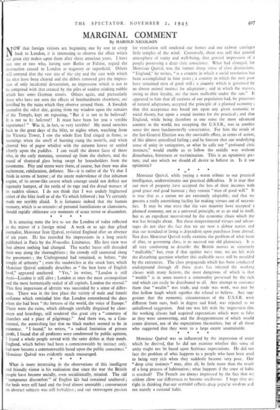It is amusing none the less to see the London
of today reflected in the mirror of a foreign mind. A week or so ago that gifted journalist, Monsieur Jean Queval, revisited England after an absence of six years. He has recorded his impressions in a long article published in Paris by the Nouvelles Litteraires. His first view was that almost nothing had changed. The scarlet buses still threaded their way along the thoroughfares ; the crowds still sauntered along the pavements ; the Underground had remained, as before, " the temple of urbanity " ; even the sandwiches at the snack bars, which Monsieur Queval unkindly describes as " the best form of English food," appeared unaltered. "Yes,' he writes, "London is still there—London is still alive ; London at once the most cosmopolitan and the most hermetically sealed of all capitals, London the eternal." This first impression of identity was succeeded by a sense of differ- ence. There was in the first place the variety of male and female uniforms which reminded him that London remembered the days when she had been " the fortress of the world, the voice of Europe." There were the ruins, which although carefully disguised by clear- ances and hoardings, still rendered this great city a " cemetery of churches and a place of pilgrimage." And there was, to a Con- tinental, the astonishing fact that no black market seemed to be in existence. " I found," he writes, " a radical limitation of private profit, I found that all profiteers were condemned by public opinion, I found a whole people served with the same dishes at their meals. England, which before had been a commonwealth by instinct only, had now become a commonwealth based upon the public conscience." Monsieur Queval was evidently much encouraged. * * * *






























 Previous page
Previous page